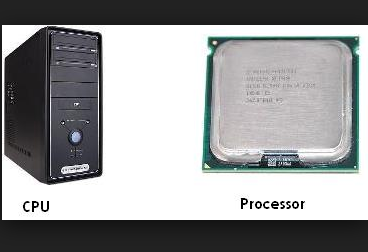CPU is a short form for Central Processing Unit. It is a electronic circuit in a computer which carries out all the
instructions of computer program
by performing all the basic type of arithmetic, logical, control and input or output operations given by
the instructions.
 |
| Define What About Central Processing Unit CPU |
In
a CPU, all primary components are called ALU (Arithmetic Logic Unit) which
performs all mathematical, logical, and decision making operations and
the CU (Control
Unit) which directs or control all the processors operations.
 |
| Define CPU |
This
term CPU has been used in computer industry since the early 1960. The term CPU means a processor and its control unit, differentiate these main
elements of a computer from external components like main memory and
peripherals.
The
design and implementation of CPU
is changed now, but their fundamental operations are same almost unchanged.
Arithmetic logic unit is a principal component
of a CPU which performs arithmetical and logical operations, hardware send that supply operands to the ALU and store that
result, and the control unit that takes all the instructions from the main memory, and solve and perform
them when it depends on the ALU and registers just because to perform all those
operations.
 |
| What About CPU |
Most
of the modern CPUs are called microprocessors,
means they are made on a single integrated
circuit chip. An IC (Integrated circuit) that contains a CPU also contains a
memory, some peripheral devices, and other types of components of a computer,
such of those devices are variously called microcontrollers.
Some computers have contained multi-core
processors in it with two or more CPUs mounted on a single chip. Which are
normally called cores. On other side, array processors and vector processor contain multiple processors which
operate in a parallel, having no single unit considered as central.
In
early time CPUs are custom designed as part of larger computer or sometimes one
of a kind of computer. Mostly this method of designing CPUs for a specific
application has widely given way to the manufacturing of mass produced
processors which are made for many kind of purposes. This kind of
standardization starts in the time of special transistor
mainframes and minicomputers which are rapidly accelerated with the integrated circuit (IC). The ICs are used to make more and more complex
CPUs because of their complex design. And because of ICs the size of CPUs also
decreased which means large powerful device in a complex shape and size. In
modern time microprocessors are appear in everything from automobile to cell
phone and children’s toys.
Transistor
based computer CPUs have many different types of advantages over their previous
CPUs of old time. Now in modern CPUs the reliability is increased and power
consumption is reduced, transistors based computer CPUs also allowed to operate
at much higher speeds as comparison to older ones because of their short
switching time. Short switching time is due to the transistor. Thanks to its
increased reliability as well as increased speed of the switching. And that’s
why we are using transistor based computer CPUs in this time.
The
fundamental operation of mostly all the CPUs are to perform sequence of all
kind of stored instructions in
memory element called a program.
All the instructions are stored in a kind of computer
memory. There are three tasks that mostly all CPUs use in operation: find,
solve, and perform.
After the
performance of an instruction, the whole process repeated again, with the next instruction normally finding the next
sequence instruction because of the increased value of the program counter. In
more complex CPUs more than one instruction can be find, solve, and performed
at a single time together which is normally common in modern time CPUs.
You Might Also Like:-
What is Motherboard
Definition of Hard-disk
Explain the RAM
Work of Processor
Put some light on Monitor











No comments:
Post a Comment